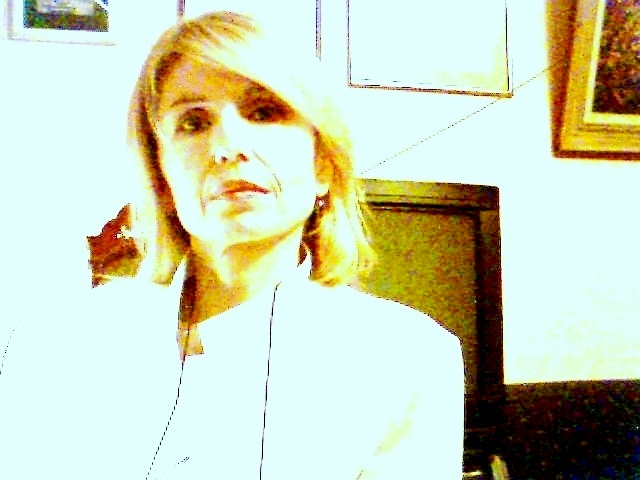|
PSYcho TRAuma Studio== PSYTRACES
| PSYCHO Therapyst Mr.Socc.Evica Busarac |

|
Executive Director Human Urban Network org. die(Cancer) ,thenceforth
Our org.Human-urban net under way reorganisation .
IZVRSNI DIREKTOR HumanoUrbane mreze Mag.soc.psi.patol. Eva Busarac je
preminula od raka zeluca koji je pocetkom marta 2008 metastazirao na pluca i podmuklo iznenada (za 10 dana ) odneo u
48 godini nasu koleginicu, humanistu,novinarku strucnu saradnicu mnogih medijskih saradnika,psihoterapijskih ordinacija, edukatora
i univerziteta kako u Beogradu tako i u Sloveniji.Nije znala da je bolestna i radila je do pred smrt, a toliko zivota i energije
je posedovala govori podatak da je iako bolestna redovno pisala svoj doktorski rad .(pored rada sa pacijenatima
i supervizijama sa specijalizantima)
Zauvek ce ostati u najlepsim secanjima klijenata i kolega i rodbine.
Always Look on the Bright Side of Life?
Author:
Eric Sabo
Medically Reviewed On: February 28, 2006
Optimists
may have another reason to feel fortunate. In a new study from the Netherlands, researchers found that
older men who are hopeful about the future are less likely to die from heart disease when compared to those who have a bleaker
outlook.
The reasons for this, says Dr. Erik Giltay,
who led the study, are not immediately clear. Optimists are healthier to begin with, and they tend to cope better with any
troubles. They are also more likely to follow their doctor's advice should they ever get sick.
Still, when the Dutch team took all these
factors into account, the thing that most stood out was feeling naturally upbeat about the future. Having a positive attitude
is often its own best reward, but its impact on the heart was particularly dramatic.
"These effects seem to be comparable and
in the range of lowering cholesterol, blood pressure or healthy diets," says Giltay, who is with the Delfland Institute of
Mental Health in the Netherlands.
The results, published in the Archives
of Internal Medicine, are among the latest to suggest that maintaining a cheerful outlook throughout life pays off in the
end. Studies have linked positive attitudes to a range of health benefits, although there is some debate on what type of optimism
matters most.
Giltay and his team investigated what is
known as dispositional optimism, which is a general belief that there is much to look forward to in the future. The researchers
asked 545 elderly men living in the picturesque town of Zutphen
about their feelings on a series of statements: "I still expect much from life," for instance, or "my days seem to be passing
by slowly."
The subjects, who took this survey every
five years, ranked these statements on a three-point scale, based on how much they agreed with them. After 15 years, the consistent
optimists cut their risk of dying from heart disease nearly in half when compared to the more pessimistic men.
Believing that bad events are not your
fault, or at least temporary, is another way to blissfully go through life, says Giltay. To his team, however, the ability
to maintain a positive outlook about the future is more fitting of a natural optimist.
Giltay says that the next step is to figure
out why such optimism benefits the heart. It is possible that happiness stimulates a positive biological reaction, much like
depression and stress triggers the opposite, but that "does not seem to be the whole answer," he adds.
Yet the findings do suggest a tempting
and easy way to beat heart disease. By adopting a positive attitude, former curmudgeons might be able to improve their health,
while making life more pleasant to those around them. Giltay is doubtful that this new attitude will come easy.
"We are not optimistic," he says. While
some forms of psychotherapy may be suitable, he cautions, "It is well known that it takes lots of effort to induce small improvements."
May 1, 1996
-- Vol.1- IDEA Journal
Autocratic Power
by : ALAN JACOBS
Today, we are faced with a serious challenge
to the continuation of what Jacob Bronowski called "The Ascent of Man".
'Knowledge is not a loose-leaf notebook of
facts. Above all it is a responsibility for the integrity of what we are, primarily of what we are as ethical creatures. You
cannot possibly maintain that informed integrity if you let other people run the world for you while you yourself continue
to live out of a rag bag of morals that come from past beliefs. That is really crucial today' (1973, p. 436).
MISUSE OF POWER
Although the glaring example of this kind of structure
is Germany during the Nazi years, it is by no means the only one. Eastern Europe under
the Soviets, Iran under Khomeini, or Kampuchia
under Pol Pot are but a few others. It is possible to define nationless entities as well; for example the religio-politification
of fundamentalist movements such as the Shiite extremists, the Jews for Jesus, the Black Muslims of Louis Farrakhan. Those
that also bear close observation are Jerry Falwell and former Moral Majority (or Liberty Foundation), and Pat Robertson, the
creator of the Christian Broadcasting Network and the Christiam Coalition.
Some movement leaders, such as Farrakhan,
Hitler, and Khomeini, define an enemy who must be destroyed, an enemy defined as the source of primordial evil (Lester, 1985,
p. 11). Others, like Stalin, Falwell and Robertson, see the evil in ideas and life-styles and initially attempt conversion.
In either case these movements begin out of moral imperative and change once they achieve power and control. Goodness is an
early posture. Later goodness is transformed into destruction as amply demonstrated by the Jonestown example. The struggle
for power is one thing, but its attainment and subsequent applications quite another. Initially the identification of both
problems and their solutions is oversimplified, thus offering the follower a quick answer to the existential dilemma created
by questions such as where did I come from, why am I here, and where am I going. People are offered oversimplified answers
that dispel fear created by doubt and uncertainty created by internal psychological conflict and external social forces. This
has become particularly dangerous in the 20th century because of sophisticated communication technology and increasing expertise
of the psycho-social sciences.
One way these forces operate is by discouraging critical thinking and moral speculation
in favor of a prepackaged imagery and doctrine designed to create impressions rather than reveal substance, to capture people's
hearts rather than stimulate their minds. Polarization and overzealous fundamentalism, whether derived from movements that
are religious, social, or political, right or left, radical or reactionary, psychoanalytic or humanistic, Christian, Muslim,
or Jewish, can grip us with a particular intensity. Perhaps it is not yet time for alarm, but surely we must learn to recognize
leaders with autocratic tendencies before they attain power, before it is too late.
George Steiner asked what are "the
internal relations between the structures of the inhuman and the surrounding, contemporary matrix of high civilization...?"(Steiner,1971,
p. 29). What is our relationship as highly civilized people to autocratic structures we see springing forth like mushrooms
through an asphalt road? And what is the attraction, the pull, to either lead or be led into these structures, indeed, to
stand and watch them form without doing anything?
"Art, intellectual pursuits, the development
of the natural sciences, many branches of scholarship flourished in close spatial, temporal proximity to massacre and the
death camps. It is the structure and meaning of that proximity that must be looked at. Why did humanistic traditions and models
of conduct prove so fragile a barrier against political bestiality?" (Steiner, 1971, p. 30)
Comparing extreme historical
occurrences of this process with current examples might give us insight into similar tendencies and thus ward off further
catastrophe. However, a word of caution about labeling others as Nazis or Fascists or Communists is in order; these terms
have often been overused and applied incorrectly. The questions we need to consider include the following: How do leaders
and followers form a "movement" that eventually oppresses others, and what is the relationship between them? What do the rest
of the people, the bystanders and others, do about it? What happens when resisters emerge or when people are enslaved?
English
(1979) addresses the relationship between Master and Slave (Follower), by describing a kind of psychological symbiosis formed
from mutually complimentary "defensive existential positions".
"These are first experienced
by the six-month-old child at the point of burgeoning individuation, away from the euphoric connection to mother. Such despair
gets forgotten but tends to... re-surface... at certain critical stages... classically at the two to three year old period..."
although "it threatens to surface at other times under conditions of stress (p. 90). During the two to three stage the basic
existential position is formed and "There ensue numerous overt and covert power struggles between the child and her principal
caretakers, following which she settles on one of the two existential positions. [I'm OK, You're Not OK, (+,-), or I'm not
OK, You are OK, (-,+).] She chooses the one which seems the most effective to ward off despair" (p. 91-92).
These
existential positions form the basis for substitute feelings and their corresponding behaviors, a construct known in transactional
analysis as rackets. The Master, in English's construct, relates to the world using rackets underpinned by the defensive existential
position (+,-) The Follower, relates from the defensive position,
(-,+). English's investigation focuses on this relationship
between the person who leads and the one who joins and follows. Together they create a structure, a movement,than can have
as its aim making the world over in its own image.
It seems all one needs in order to avoid being seduced by some movement
is an ability to recognize the early moves in the symbiotic relationship, Master/Slave. To describe this relationship is task
enough, to be sure, yet one wonders about the social medium in which this relationship is allowed to flourish. What of those
individuals outside the core relationship such as the Bystanders? There are more of them than exist within the autocratic
structure growing in their midst. As Lillian Hellman said (1939, Act III), 'There are people who eat the earth and eat all
the people on it, like in the Bible with the locusts. And other people who stand around and watch them eat it.'
Extract

|
| ILUZIJA |
|

